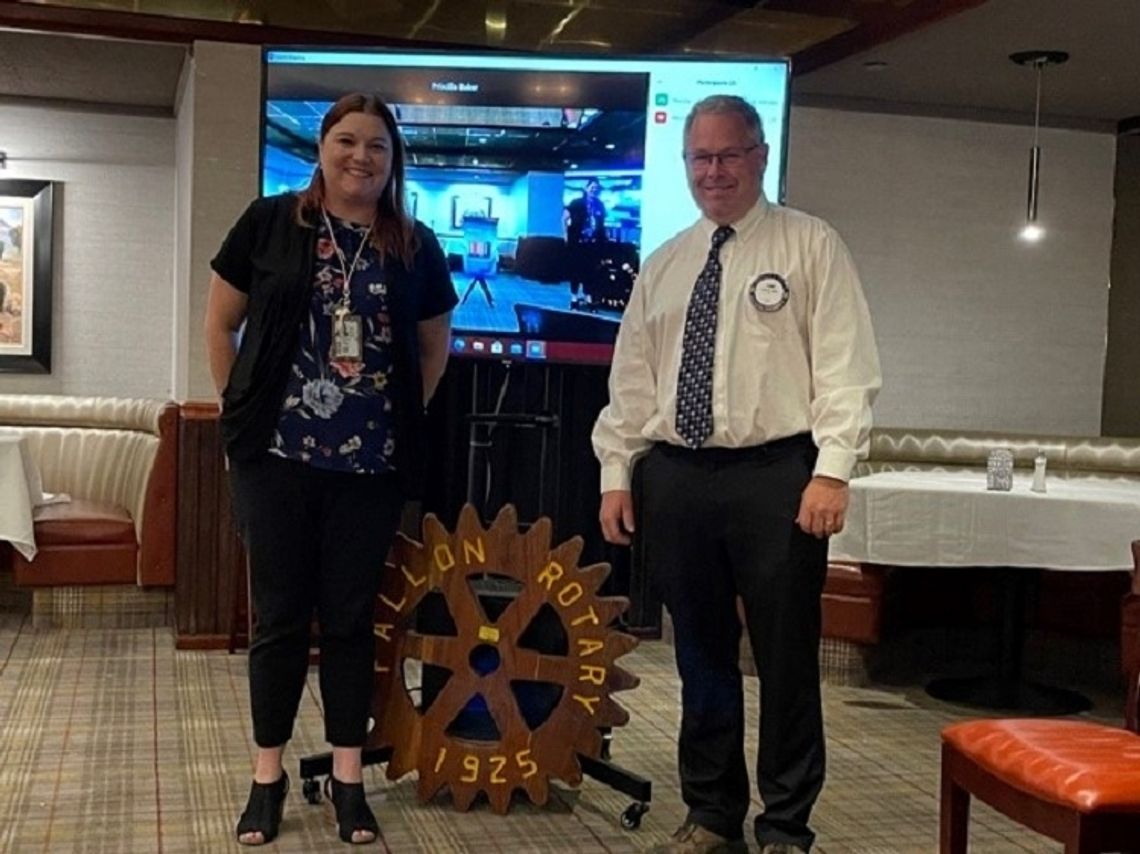Shanna Schroeder is a Cyber Warfare Specialist who works at Naval Air Station Fallon fighting cyber-attacks and criminal activity, spoke this week to the Rotary Club. She offered suggestions and tips for community members to protect themselves and their computing devices from the same kinds of attacks the military often sees. Schroeder talked about the Colonial Pipeline Cyber Attack that took down the largest fuel pipeline in the U.S. this May, as well as similar ransomware attacks that have plagued several local governments.
After graduating from Reed High School in Sparks, Schroeder enlisted in the Navy in 1997. After Basic Training she served in South Korea, then aboard the U.S.S Carl Vinson, followed by the Fleet Readiness Center Northwest on Whidbey Island, and in Germany. She has been at NAS Fallon since 2010.
According to Schroeder, the Federal Bureau of Investigation (FBI) is responsible for investigating cybercrime and over the past 20 years, has logged over six million cyber complaints with the number growing exponentially every day. In the past year, from March 2020 to March 2021, the Internet Crime Complaint Center (IC3) has received one million reports and complaints. The top crimes reported by victims in 2020 were phishing scams, non-payment/non-delivery scams, extortion with victims losing money to business email scams, romance and con-schemes, and investment fraud. “I’m fortunate to work with the FBI and they are fantastic to work with,” said Schroeder. “The resources are there for anyone in the community who needs them.”
She explained that recently the Yerington Tribe was hit by a Ransomware attack, demanding money for access back into their computer system. Fortunately, the Tribe had cyber insurance which covered the attack, and they were eventually able to get back into their system. When the same thing happened to the Lyon County School District their cyber insurance covered the cost of regaining access to their system, however, they were not able to recover all that had been lost. “Hackers don’t necessarily have access to your system to restore your data, they just have enough access to lock you out of your system,” Schroeder said.
Having an off-site backup or more than one is necessary in times like these. “Where are your off-site backups?” asked Schroeder, “Lyon had none – no off-server sites.” The hackers responsible were traced to the Ukraine, but they still have not recovered all their data.
“Which leads to the pipeline,” she said. The Colonial Pipeline was compromised because someone was able to use an employee password and gain access to the system. The company did not use a two-factor authentication to their server, so with only one password, the hackers got into the system. She recommended against saving passwords on phones or computers and to always use two-factor authentication.
Schroeder also expressed the importance of knowing where your data is stored. At NAS Fallon there are several off-site backup locations and Schroeder said if the base were hacked, one server could be shut down, but not all. “We may lose something, but not everything.”
Contrary to a rumor that Yahoo servers are based in China, she researched to find that Yahoo is owned by Verizon who has servers for their U.S. clients spread across the country.
TikTok, a social media company owned by a Chinese corporation, and similar to Snapchat, has no safety protection filters available to parents. “Watch your kids and know where they are going and who they are talking to, the people who do these things live among us.” Cyber threats vary and can be extremely dangerous.
In April, a colleague of Schroeder’s who worked in the IT department on base pled guilty to numerous charges of distributing child pornography. “This guy was right under my nose.” Considering him a plausible threat, the FBI chose to arrest him on base where they knew he would not have access to a weapon. When they raided his home, to confiscate the electronic equipment, Schroeder said the FBI found loaded guns at every entrance to the home, as well as a bunker built in the pantry fully stocked with MREs (Meals Ready-to-Eat).
“Since COVID, our kids are living on electronics and sexual predators are using this technology to exploit our children,” Schroeder stated. As an example, she said there is a game called Roadblock that children as young as six to ten years old are playing. Predators are contacting these children and offering them 100 Roadblock Bucks if they will send nude photos of themselves. With even just one photo, they have a child under their control and then begin to threaten them, their families, and soon continue pressuring them for more and more photos and videos. Sadly, the extent of this pressure and fear is even driving some children to commit suicide. “This is happening here in our community every day,” said Schroeder, “I talked to one FBI agent who spends all day online pretending to be a 15-year-old girl trying to catch these individuals.” Hackers are often motivated by money, notoriety, disrupting governments, or by making a political statement. Internet predators, however, have much darker motivations in mind.
Schroeder provided information parents can use including a website, https://report.cybertip.org/, and a phone number for the FBI, 1-800-CALLFBI. Parents should also be aware of their children using X-Box, Snapchat, and an app called Kik that is encrypted and run by a company that refuses to cooperate with law enforcement. The FBI has many resources online that can be found at: https://www.fbi.gov/scams-and-safety/protecting-your-kids.













































Comment
Comments